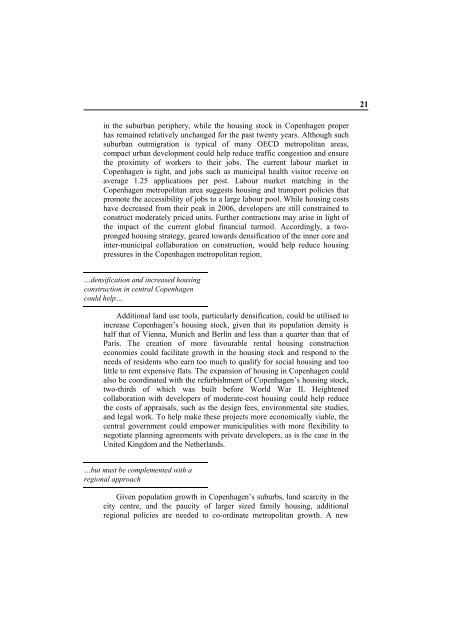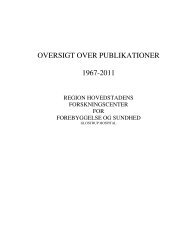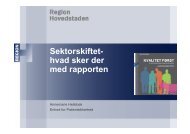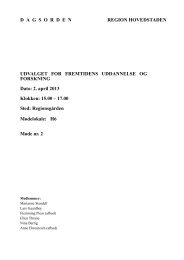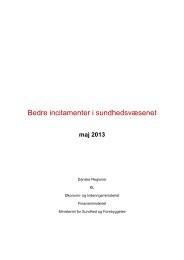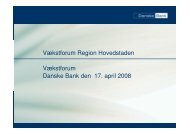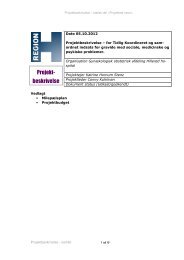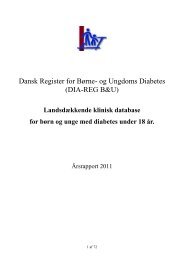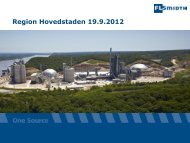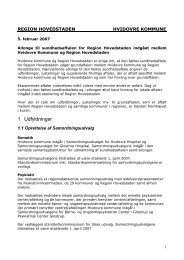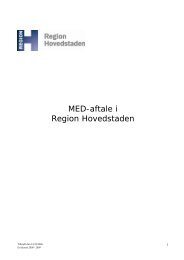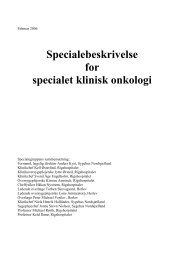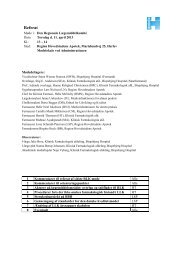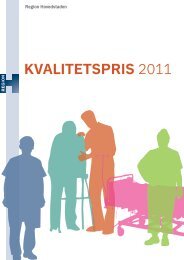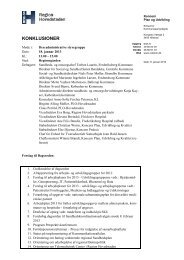- Page 1 and 2: Territorial Review Copenhagen Preli
- Page 3 and 4: 3 Acknowledgements This Review was
- Page 5 and 6: 5 Table of contents Chapter 1: The
- Page 7 and 8: 7 Assessment and Recommendations Co
- Page 9 and 10: 9 Its international ranking is mixe
- Page 11 and 12: 11 The lack of skill is of paramoun
- Page 13 and 14: 13 qualifications of immigrants and
- Page 15 and 16: 15 more than twice average full-tim
- Page 17 and 18: 17 Commercialisation of research co
- Page 19: 19 surpassed only by Spain and Swed
- Page 23 and 24: 23 emissions by 25% since 1990 and
- Page 25 and 26: 25 and the other municipalities in
- Page 27 and 28: 27 instruments at its disposal. A s
- Page 29 and 30: 29 Chapter 1: The competitiveness o
- Page 31 and 32: 31 Figure 1.2. Map of Copenhagen an
- Page 33 and 34: 33 other areas in Denmark are more
- Page 35 and 36: 35 Figure 1.5. Map of Copenhagen an
- Page 37 and 38: 37 Figure 1.7. Regional GDP in % of
- Page 39 and 40: 39 Copenhagen plays a crucial role
- Page 41 and 42: 41 Figure 1.8. Monthly unemployment
- Page 43 and 44: 43 Figure 1.10. Co-patents between
- Page 45 and 46: 45 Table 1.4. Employment and value-
- Page 47 and 48: 47 Table 1.6. Overview of studies o
- Page 49 and 50: 49 capital. As Table 1.7 shows, the
- Page 51 and 52: Rank Total Accounting Advertising F
- Page 53 and 54: 53 Potential of a more integrated
- Page 55 and 56: 55 Figure 1.12. Economic growth in
- Page 57 and 58: 57 If a broader definition of econo
- Page 59 and 60: 59 …but is only moderately succes
- Page 61 and 62: 61 Region. The variation in tertiar
- Page 63 and 64: 63 Education and skills Education o
- Page 65 and 66: 65 Øresund as part of the solution
- Page 67 and 68: 67 Under-utilisation of immigrants
- Page 69 and 70: 69 Figure 1.18. Share of foreign-bo
- Page 71 and 72:
71 the countries that attract the m
- Page 73 and 74:
73 both the public and private sect
- Page 75 and 76:
75 figures in the THES rankings of
- Page 77 and 78:
77 (FORA, 2008). This is in line wi
- Page 79 and 80:
79 most other OECD countries (OECD,
- Page 81 and 82:
81 Several OECD countries score bet
- Page 83 and 84:
83 fewest procedures in the world f
- Page 85 and 86:
85 recorded in the OECD (OECD, 1999
- Page 87 and 88:
87 50 000 population; New Zealand:
- Page 89 and 90:
89 ensuring that these 38 000 dwell
- Page 91 and 92:
91 progress has been made - the lev
- Page 93 and 94:
93 the region‘s groundwater aquif
- Page 95 and 96:
95 rising sea levels (which could r
- Page 97 and 98:
Car theft per 1000 inhabitants (200
- Page 99 and 100:
99 challenges, such as delays and c
- Page 101 and 102:
101 Figure 1.34. Congestion in sele
- Page 103 and 104:
immigrants and students, who enter
- Page 105 and 106:
105 8 Copenhagen metropolitan regio
- Page 107 and 108:
107 ranking rates 200 universities
- Page 109 and 110:
109 32 One notable exception is the
- Page 111:
111 44 Københavns Energi (Copenhag
- Page 114 and 115:
114 governments and the majority of
- Page 116 and 117:
116 main challenges for the region
- Page 118 and 119:
118 Box 2.1. Economic linkages betw
- Page 120 and 121:
120 technicians. Since the Structur
- Page 122 and 123:
122 Figure 2.1. Denmark’s plannin
- Page 124 and 125:
124 by openness, quality consciousn
- Page 126 and 127:
126 2.3 Skills policies Recent labo
- Page 128 and 129:
128 exams. This system gives univer
- Page 130 and 131:
130 municipality, which in principl
- Page 132 and 133:
132 intention of developing and spr
- Page 134 and 135:
134 highly skilled migrants. Such p
- Page 136 and 137:
136 the effectiveness of innovation
- Page 138 and 139:
138 they suggest that exploratory r
- Page 140 and 141:
140 bureaucratic. First-tier fundin
- Page 142 and 143:
142 The priority on high-growth ent
- Page 144 and 145:
144 Creative entrepreneurship Preli
- Page 146 and 147:
146 therefore be targeted at these
- Page 148 and 149:
148 A current constraint in busines
- Page 150 and 151:
150 2009 will provide some first in
- Page 152 and 153:
152 Box 2.4. Ørestad development-I
- Page 154 and 155:
154 dealing with the expected incre
- Page 156 and 157:
156 but it does not have clear prio
- Page 158 and 159:
158 In designing a detailed scheme
- Page 160 and 161:
160 of demand management tool in th
- Page 162 and 163:
162 elasticity of short-distance lo
- Page 164 and 165:
164 bridge construction but for stu
- Page 166 and 167:
166 The consequence of the Fehmarn
- Page 168 and 169:
168 Local and national housing poli
- Page 170 and 171:
170 increased by approximately 40%
- Page 172 and 173:
172 disproportionately affected. Th
- Page 174 and 175:
174 in Denmark (Andersen, 2008). Mu
- Page 176 and 177:
176 Given the diversity of the buil
- Page 178 and 179:
178 them from implementing more pro
- Page 180 and 181:
180 guidelines in the forthcoming C
- Page 182 and 183:
182 A wide range of environmental i
- Page 184 and 185:
184 Denmark's National Board of Hea
- Page 186 and 187:
186 conditions, and natural ventila
- Page 188 and 189:
188 mandated to integrate respect f
- Page 190 and 191:
190 with a further EUR 220 million
- Page 192 and 193:
192 inter-linkages between economic
- Page 194 and 195:
194 Although these national framewo
- Page 196 and 197:
196 schools, teachers and pedagogue
- Page 198 and 199:
198 17 In 1997, the average price f
- Page 200 and 201:
200 literature and case law that mu
- Page 202 and 203:
202 eco-project that will be showca
- Page 205 and 206:
205 Chapter 3: metropolitan governa
- Page 207 and 208:
207 regional level, the 16 existing
- Page 209 and 210:
209 and education. Expenditure for
- Page 211 and 212:
211 Administrative boundaries do no
- Page 213 and 214:
213 Figure 3.5. Dominance of the co
- Page 215 and 216:
215 airport, a new metro line betwe
- Page 217 and 218:
217 instruments, it has funds at it
- Page 219 and 220:
219 Box 3.3. Relations between metr
- Page 221 and 222:
221 Figure 3.6. Under-representatio
- Page 223 and 224:
223 Authority, set up to deal with
- Page 225 and 226:
225 providing services to other mun
- Page 227 and 228:
227 municipalities in Copenhagen wa
- Page 229 and 230:
229 3.4 Political leadership The Ci
- Page 231 and 232:
231 mayors; permitting only the eco
- Page 233 and 234:
233 While international migration m
- Page 235 and 236:
235 Human resources management in t
- Page 237 and 238:
237 developed, notably by the natio
- Page 239 and 240:
This governance framework poses cha
- Page 241 and 242:
241 Annex 1: Conceptual Framework T
- Page 243 and 244:
243 over 1980-2003, confirm the pre
- Page 245 and 246:
245 efficiency of the labour market
- Page 247 and 248:
247 population growth was strongly
- Page 249 and 250:
249 specialised places are better s
- Page 251 and 252:
251 trend can mainly be explained b
- Page 253 and 254:
253 partnerships between firms and
- Page 255 and 256:
255 workers. Even though relative p
- Page 257 and 258:
257 indicators such as GDP per capi
- Page 259 and 260:
259 institutional proxies of commun
- Page 261 and 262:
261 Bibliography Acs, Z. and C. Arm
- Page 263 and 264:
263 Bikes Belong (2008), ―Bicycli
- Page 265 and 266:
265 CBS (2005e), A Mapping of Danis
- Page 267 and 268:
267 City of Vancouver (2007), ―Re
- Page 269 and 270:
269 Demographia (2008), ―4th Annu
- Page 271 and 272:
271 Faugert, S. et al. (2004), ―E
- Page 273 and 274:
273 Gyourko, J. and J. Tracy (1989)
- Page 275 and 276:
275 Konkurrencestyrelsen (2004), Ko
- Page 277 and 278:
277 Meijiers and Romeim (2003) ―R
- Page 279 and 280:
279 OECD (1996), Innovative Policie
- Page 281 and 282:
281 Rappaport, J. and J. Sachs (200
- Page 283 and 284:
283 Statistics Denmark (2008) ―IN


